七年级英语上册一般现在时
七年级上四单元语法知识点

七年级上四单元语法知识点在七年级上册英语中,第四个单元是语法单元。
在这个单元中,学生将会学习英语中一些基本的语法知识。
下面是本单元中学生需要掌握的语法知识点。
1. 一般现在时一般现在时是表示经常性或习惯性行为的时态。
例如:“He likes to play basketball on weekends.”在这个句子中,“likes”就是一般现在时的形式。
我们可以看出,这里的主语是第三人称单数形式,所以动词需要加上“s”。
2. 现在进行时现在进行时是表示正在进行或发生的行为的时态。
例如:“Sheis studying English in the library now.”在这个句子中,“is studying”就是现在进行时的形式。
我们可以看出,这里的动词是用现在分词形式,后面跟着“be”动词的相应形式。
3. 一般过去时一般过去时是表示过去发生的事情的时态。
例如:“I watched a movie yesterday.”在这个句子中,“watched”就是一般过去时的形式。
我们可以看出,这里的动词是过去时的形式。
4. 过去进行时过去进行时是表示在过去某个时间正在进行或发生的行为的时态。
例如:“She was eating dinner when I arrived.”在这个句子中,“was eating”就是过去进行时的形式。
我们可以看出,这里的动词是用过去分词形式,后面跟着“be”动词的相应形式。
5. 情态动词情态动词是表示语气、情绪、想法等诸多方面的动词。
例如:can,could,may,might,shall,should,will,would,must等。
6. 否定句和疑问句当我们需要构造否定句时,通常使用不定式“don't”或“doesn't”,例如:“He doesn't like Chinese food.”而在构造疑问句时,则需要把助动词放在主语前面。
例如:“Do you like music?”7. 直接和间接引语在英语中,有两种引用他人说话的方式,一种是直接引语,一种是间接引语。
七年级上册英语unit3语法知识点

七年级上册英语unit3语法知识点七年级上册英语Unit 3 语法知识点英语语法对于英语学习者来说是非常重要的,尤其是对于初学者。
在七年级上册的英语课程中,Unit 3 包括了很多重要的语法知识点,本文将为大家详细介绍这些知识点及其用法。
1. 一般现在时一般现在时是英语中最常用的时态,表示当前或经常性的动作,也可以指状态。
其构成为主语 + 动词原形。
例如:“She likes music.” (“她喜欢音乐。
”)2. 现在进行时现在进行时表示正在发生的动作,其构成为主语+ “be” 动词(am/is/are) + 现在分词。
例如:“She is singing now.” (“她正在唱歌。
”)3. 一般过去时一般过去时表示过去某个时间发生过的动作,其构成为主语 + 动词的过去式。
例如:“I watched TV last night.” (“昨晚我看了电视。
”)4. 过去进行时过去进行时表示过去某个时间正在进行的动作,其构成为主语+ “was/were” + 现在分词。
例如:“I was watching TV last night.” (“昨晚我正在看电视。
”)5. 一般将来时一般将来时表示将来要发生的动作,其构成为主语+ “will” + 动词原形。
例如:“I will go to the cinema tomorrow.” (“我明天会去电影院。
”)6. 将来进行时将来进行时表示将来某个时间正在进行的动作,其构成为主语+ “will be” + 现在分词。
例如:“I will be watching TV at 8 PM tomorrow.” (“我明天晚上8点正在看电视。
”)7. 现在完成时现在完成时表示过去已经完成了的动作,并且与现在有关,其构成为主语+ “have/has” + 过去分词。
例如:“I have finished my homework.” (“我已经完成了我的家庭作业。
七年级英语上册时态知识点
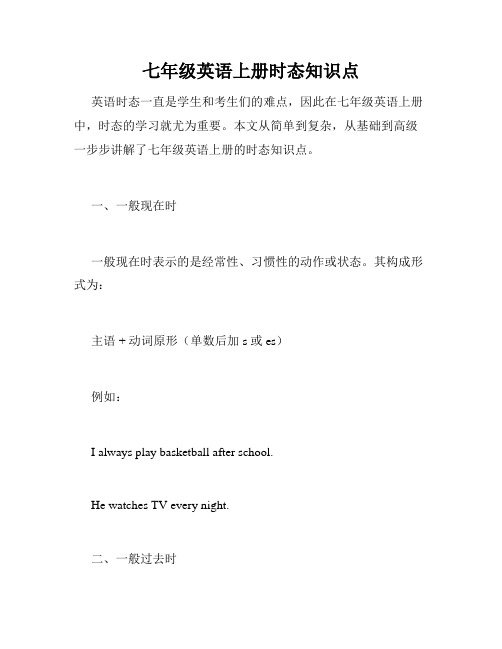
七年级英语上册时态知识点英语时态一直是学生和考生们的难点,因此在七年级英语上册中,时态的学习就尤为重要。
本文从简单到复杂,从基础到高级一步步讲解了七年级英语上册的时态知识点。
一、一般现在时一般现在时表示的是经常性、习惯性的动作或状态。
其构成形式为:主语 + 动词原形(单数后加 s 或 es)例如:I always play basketball after school.He watches TV every night.二、一般过去时一般过去时表示的是过去某个时间里发生的动作或状态。
其构成形式为:肯定句:主语 + 过去式否定句:主语+ didn’t + 动词原形(didn’t 即 did not 的缩写,代表否定的意思)疑问句:Did + 主语 + 动词原形例如:肯定句:I went to New York last summer.否定句:She didn’t come to the party.疑问句:Did Tom study for the test yesterday?三、一般将来时一般将来时表示的是将来某个时间里发生的动作或状态。
其构成形式为:主语 + will + 动词原形例如:I will visit my grandparents next weekend.She will go to the movies with her friends tonight.四、现在进行时现在进行时表示的是现在正在进行的动作。
其构成形式为:主语 + am / is / are + 现在分词例如:I am watching TV now.They are playing soccer in the yard.五、现在完成时现在完成时表示的是过去某个时间以来一直持续到现在的动作或状态。
其构成形式为:主语 + have / has + 过去分词例如:I have studied English for three years.He has been sick for a week.六、过去进行时过去进行时表示的是过去某个时间正在进行的动作。
七年级上册一般现在时知识点
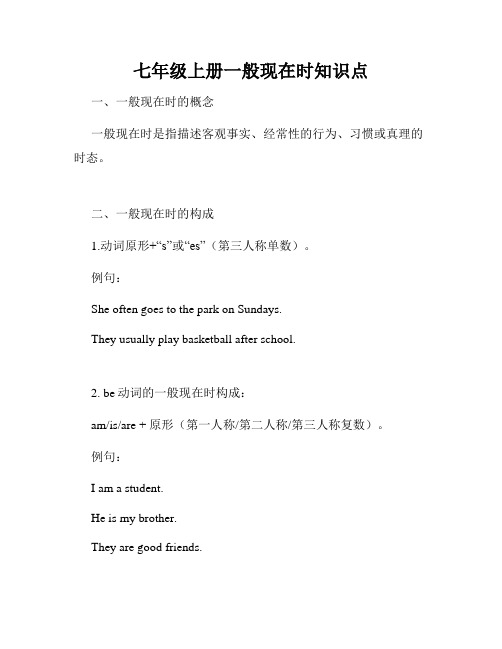
七年级上册一般现在时知识点一、一般现在时的概念一般现在时是指描述客观事实、经常性的行为、习惯或真理的时态。
二、一般现在时的构成1.动词原形+“s”或“es”(第三人称单数)。
例句:She often goes to the park on Sundays.They usually play basketball after school.2. be动词的一般现在时构成:am/is/are + 原形(第一人称/第二人称/第三人称复数)。
例句:I am a student.He is my brother.They are good friends.三、一般现在时的用法1.表示经常性的行为或习惯。
例句:I always get up at six in the morning.John never eats breakfast before he goes to school.2.表示客观事实、真理或普遍规律。
例句:The sun rises in the east and sets in the west. Water boils at 100 degrees Celsius.3.表示现在的状态或情况。
例句:She looks tired today.The weather is getting colder these days.4.表示说明原因、解释原因或评论事实。
例句:I study hard because I want to go to college.He is a good student, but he needs to improve his writing skills.四、注意事项1.动词要与主语保持一致。
例句:My sister likes playing tennis.(正确)My sister like playing tennis.(错误)2.第三人称单数动词要加“s”或“es”。
人教版七年级上册英语时态讲解
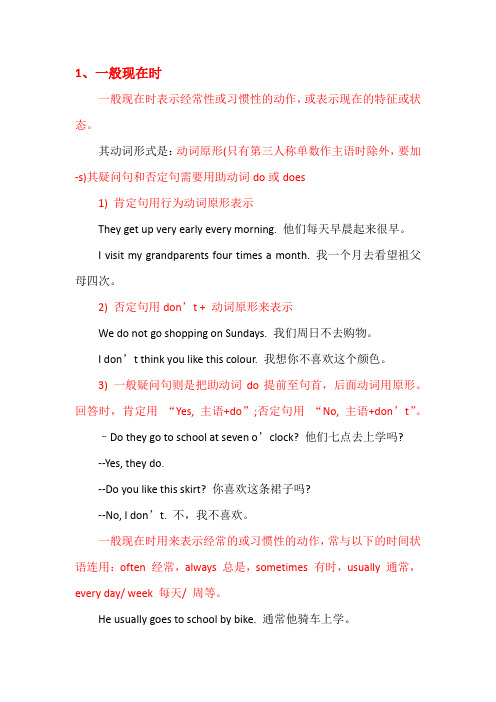
1、一般现在时一般现在时表示经常性或习惯性的动作,或表示现在的特征或状态。
其动词形式是:动词原形(只有第三人称单数作主语时除外,要加-s)其疑问句和否定句需要用助动词do或does1) 肯定句用行为动词原形表示They get up very early every morning. 他们每天早晨起来很早。
I visit my grandparents four times a month. 我一个月去看望祖父母四次。
2) 否定句用don’t + 动词原形来表示We do not go shopping on Sundays. 我们周日不去购物。
I don’t think you like this colour. 我想你不喜欢这个颜色。
3) 一般疑问句则是把助动词do提前至句首,后面动词用原形。
回答时,肯定用“Yes, 主语+do”;否定句用“No, 主语+don’t”。
–Do they go to school at seven o’clock? 他们七点去上学吗?--Yes, they do.--Do you like this skirt? 你喜欢这条裙子吗?--No, I don’t. 不,我不喜欢。
一般现在时用来表示经常的或习惯性的动作,常与以下的时间状语连用:often 经常,always 总是,sometimes 有时,usually 通常,every day/ week 每天/ 周等。
He usually goes to school by bike. 通常他骑车上学。
I visit my grandparents every week. 我每个星期都去看祖父母。
She is always late for class. 她总是上课迟到。
My parents and I sometimes go out to eat. 我和父母有时出去吃饭。
It often rains here. 这儿常常下雨。
英语七年级上册一般现在时
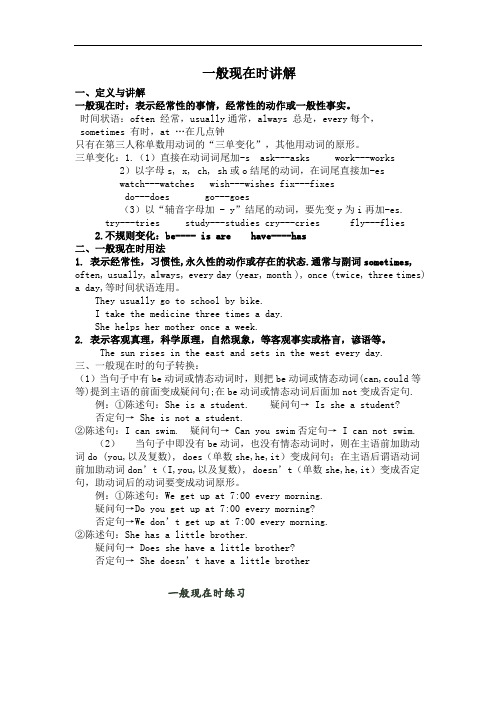
一般现在时讲解一、定义与讲解一般现在时:表示经常性的事情,经常性的动作或一般性事实。
时间状语:often 经常,usually通常,always 总是,every每个,sometimes 有时,at …在几点钟只有在第三人称单数用动词的“三单变化”,其他用动词的原形。
三单变化:1.(1)直接在动词词尾加-s ask---asks work---works 2)以字母s, x, ch, sh或o结尾的动词,在词尾直接加-eswatch---watches wish---wishes fix---fixesdo---does go---goes(3)以“辅音字母加 - y”结尾的动词,要先变y为i再加-es.try---tries study---studies cry---cries fly---flies2.不规则变化:be---- is are have----has二、一般现在时用法1. 表示经常性,习惯性,永久性的动作或存在的状态.通常与副词sometimes, often, usually, always, every day (year, month ), once (twice, three times) a day,等时间状语连用。
They usually go to school by bike.I take the medicine three times a day.She helps her mother once a week.2. 表示客观真理,科学原理,自然现象,等客观事实或格言,谚语等。
The sun rises in the east and sets in the west every day.三、一般现在时的句子转换:(1)当句子中有be动词或情态动词时,则把be动词或情态动词(can,could等等)提到主语的前面变成疑问句;在be动词或情态动词后面加not变成否定句.例:①陈述句:She is a student. 疑问句→ Is she a student?否定句→ She is not a student.②陈述句:I can swim. 疑问句→ Can you swi m否定句→ I can n ot swim.(2)当句子中即没有be动词,也没有情态动词时,则在主语前加助动词do (you,以及复数), does(单数she,he,it)变成问句;在主语后谓语动词前加助动词don’t(I,you,以及复数), doesn’t(单数she,he,it)变成否定句,助动词后的动词要变成动词原形。
七年级英语上册一般现在时
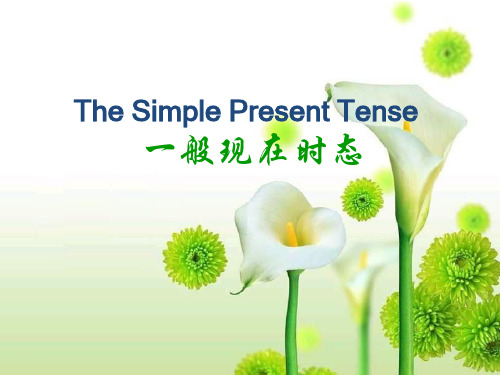
28. They want to buy some food . (对画线部 分提问) they want to buy ?
29. She watches TV on Saturday evening . (对 画线部分提问) she TV ?
30. She often has a drink of water after supper . (变为一般疑问句) she often supper ? a drink of water after
to our new shop, please. 二.用be动词的适当形式填空。 1. I a student . You a teacher .
2. She
my friend.
not . .
Mr. green very busy?Yes , he
5. He must
13. My family always like thrillers . (对画 线部分提问) your family always like ? 14. Jane’s sister wants to see the comedy . (变为一般疑问句) Jane’s sister to see the comedy ?
1.This is
my pencil ? (变一般疑
your pencil ?
问句)
2. These red socks are Kate’s . (变一般 疑问句) socks Kate’s ? 3. I want to buy a big green bag . (变特 殊疑问句) you want to buy ? 4. Mary does not have any books . (变肯 定句)Mary books .
初一上册英语语法总结
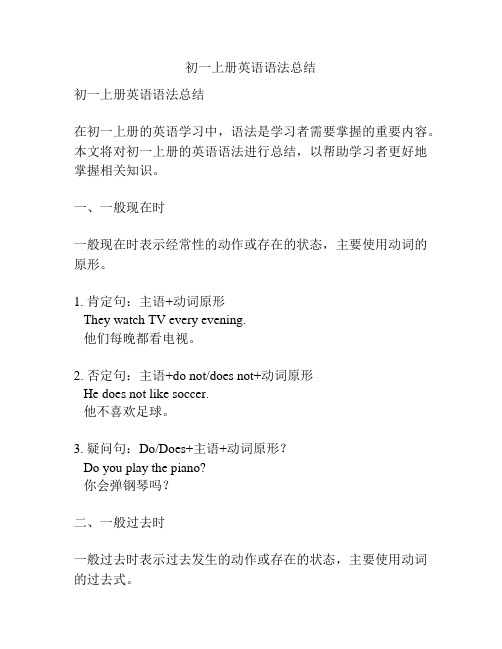
初一上册英语语法总结初一上册英语语法总结在初一上册的英语学习中,语法是学习者需要掌握的重要内容。
本文将对初一上册的英语语法进行总结,以帮助学习者更好地掌握相关知识。
一、一般现在时一般现在时表示经常性的动作或存在的状态,主要使用动词的原形。
1. 肯定句:主语+动词原形They watch TV every evening.他们每晚都看电视。
2. 否定句:主语+do not/does not+动词原形He does not like soccer.他不喜欢足球。
3. 疑问句:Do/Does+主语+动词原形?Do you play the piano?你会弹钢琴吗?二、一般过去时一般过去时表示过去发生的动作或存在的状态,主要使用动词的过去式。
1. 肯定句:主语+动词过去式He watched a movie last night.他昨晚看了一部电影。
2. 否定句:主语+did not+动词原形I did not finish my homework.我没有完成作业。
3. 疑问句:Did+主语+动词原形+?Did they go to the park yesterday?他们昨天去公园了吗?三、一般将来时一般将来时表示将来要发生的动作或存在的状态,主要使用助动词will。
1. 肯定句:主语+will+动词原形We will have a party next Sunday.下个星期天我们将开个派对。
2. 否定句:主语+will not+动词原形She will not go to school tomorrow.她明天不去上学。
3. 疑问句:Will+主语+动词原形+?Will you visit your grandparents this weekend?这个周末你会去看望你的爷爷奶奶吗?四、现在进行时现在进行时表示现在进行着的动作,主要使用be动词的现在分词。
1. 肯定句:主语+am/is/are+动词的现在分词She is reading a book now.她现在正在看书。
- 1、下载文档前请自行甄别文档内容的完整性,平台不提供额外的编辑、内容补充、找答案等附加服务。
- 2、"仅部分预览"的文档,不可在线预览部分如存在完整性等问题,可反馈申请退款(可完整预览的文档不适用该条件!)。
- 3、如文档侵犯您的权益,请联系客服反馈,我们会尽快为您处理(人工客服工作时间:9:00-18:30)。
13. My family always like thrillers . (对画 线部分提问) your family always like ? 14. Jane’s sister wants to see the comedy . (变为一般疑问句) Jane’s sister to see the comedy ?
28. They want to buy some food . (对画线部 分提问) they want to buy ?
29. She watches TV on Saturday evening . (对 画线部分提问) she TV ?
30. She often has a drink of water after supper . (变为一般疑问句) she often supper ? a drink of water after
15. She likes 16. It’s time
(buy ) some new clothes .
(play) chess . (play) games .
17. You must
Julia and her mother live in the same city ?
20. The teacher wants to join a music club . (变为 特殊疑问句) club the teacher want to join ? 21. She doesn’t know when to join the rock band . (变为肯定句)She when to join the rock band . 22. My mother usually has lunch at 12:12 . (对画 线部分提问) your mother usually lunch ?
31. That is an apple tree . (变为复数句)
32. Mike’s birthday is February 19th . (对画线 部分提问) is Mike’s birthday ?
33. Come down to our new shop, please. (变为否 定句)
9. Lily and Lucy are fifteen years old now . (对画线部分提问) Lily and Lucy ? 10. Her dog is 2 years and 5 months old . (变 为否定句) Her dog 2 years and 5 months old . 11. I usually get up at seven o’clock . (用he改 写句子) at seven o’clock . 12. He often has hamburger and apples for dinner . (变为一般疑问句)
18. ________ your Number Seven?
三.用所给动词的适当形式填空。
1. My classmate bike . 2. His sister usually am . 3. Lin Tao 4. Let me (know) the man on the (go) to school at 7:00
5. The clothing shop is on sale . (变为否 定句)
6. She likes the black bag very much . (变为否 定句) 7. I buy the pants for only 50 Yuan. (用she改 写句子) the pants for only 50 Yuan. 8. It’s an English dictionary . (对画线部分提 问)
1.be 动词的一般现在时的句式: 肯定句:主语+be+表语(n., adj.等)
e.g. He is a worker. You are thirteen. They are in the classroom.
否定句:主语+be+ not+表语
e.g. He is not a worker. You aren’t thirteen. They aren’t in the classroom. e.g. Is he a worker? Yes, he is./No, he isn’t. Are you thirteen? Are they in the classroom? Yes, they are. No, they aren’t.
15. Maria and Jack come to this school on Monday . (对画线部分提问) Maria and Jack come to this school ?
16. Titanic is really a great sad movie . (对画 线部分提问) Titanic ? 17. I think this documentary is boring . (变复 数句) think boring . 18. Mike can play the guitar . (对画线部分提 问) Mike ? 19. Julia and her mother can live (居住) in the same city . (变一般疑问句)
(like) his new sweater . (have) a look .
5. Let’s
(play) tennis !
6.
he
(like) English ? (go) to a movie .
7. I want
8. He
9. Nice 10. Can I
(not know)the teacher’s name
25. This girl is Joy Smith . (变为特殊疑问 句) is this girl ?
26. The twins are eleven . (变为特殊疑问 句) are the twins ? 27. The students study English every day . (对 画线部分提问) the students study every day ?
(meet) you ! (ask) the policeman ?
11. (sit) down and tea . 12.
(have) a cup of
(not look) at your book !
13.
you
(can see)the bananas on the tabnt Tense
一般现在时态
一般现在时(The Simple Present Tense)
1.表示现在的状态:
e.g. He’s twelve. She’s at work. 2.表经常或习惯性的动作: e.g. I get up at 6:30 every day. He reads English every morning. 3.表主语具备的性格和能力等: e.g. She likes noodles. They speak French. 4.普遍真理和自然规律: e.g. Two plus four is six. The moon goes around the earth.
1.This is
my pencil ? (变一般疑
your pencil ?
问句)
2. These red socks are Kate’s . (变一般 疑问句) socks Kate’s ? 3. I want to buy a big green bag . (变特 殊疑问句) you want to buy ? 4. Mary does not have any books . (变肯 定句)Mary books .
23. Li Xing goes home late on Friday afternoon . (变为一般疑问句) Li Xing home late on Friday afternoon ?
24. Li Xing goes home late on Friday afternoon . (对画线部分提问) Li Xing goes home late ?
一般疑问句:Be+主语+表语?
特殊疑问句:疑问词+be+主语?
e.g. What is he? What colour is that bird? How old are you? Where are they ?
2.实义动词的一般现在时句式: 肯定句:主语(I/We/You/They)+实义动词+其他 e.g. I stay at home on Saturdays. They have sports every day. 主语(He/She/It)+实义动词三单现形式+其他 e.g. He stays at home on Saturdays. Lucy has sports every day. 否定句:主语(I/We/You/They)+do+ not+动词原形+其他 e.g. I don’t stay at home on Saturdays. They don’t have sports every day. 主语(He/She/It)+does +not+动词原形+其他 e.g. He doesn’t stay at home on Saturdays. Lucy doesn’t have sports every day. 一般疑问句:Do+主语(I/we/you/they)+动词原形+其他? e.g. Do you stay at home on Saturdays? Do they have sports every day? Does+主语(he/she/it)+动词原形+其他? e.g. Does he stay at home on Saturdays? Does Lucy have sports every day?
